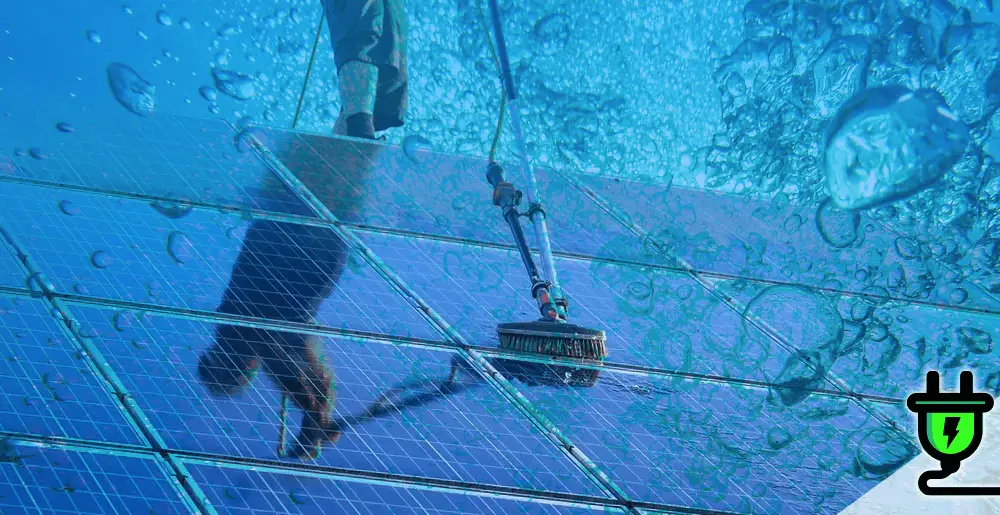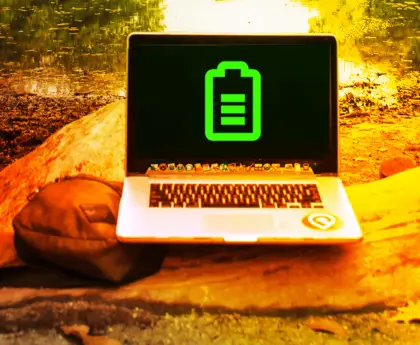Are you worried about maintaining the efficiency of your solar system and wondering how often to clean solar panels?
It’s generally recommended to clean solar panels twice yearly (spring and fall) for optimal efficiency based on location and environment. However, monitor performance regularly and adjust cleaning frequency accordingly.
Studies show that not cleaning solar panels regularly can lead to a 5% energy loss after just three months, increasing by 5% every month thereafter.
In this guide, we simplify the process for you by highlighting key factors that impact the frequency of cleaning, best practices for taking care of your panels, and why regular maintenance is so critical.
Get ready to power up your knowledge on keeping those solar panels sparkly clean!
Factors that Determine the Frequency of Solar Panel Cleaning
The frequency of solar panel cleaning is determined by local weather conditions, the level of pollution and dust accumulation in the area, as well as the tilt and angle of the panels.
Local weather conditions
Local weather conditions heavily influence the cleaning frequency of solar panels. Places with high rainfall may require infrequent cleaning as rainwater can naturally clear debris off the surface of the panels.
Conversely, regions that experience little to no rainfall or are prone to dust storms and heavy winds necessitate more frequent cleanings. It’s crucial to keep track of local climate trends such as pollen levels in springtime because excess pollen can form a thick layer on your panels, reducing their efficiency significantly.
Although rain is helpful to some extent, it doesn’t negate the need for regular maintenance. Without proper upkeep, even minimal dirt accumulation can lead to an energy loss of about 5% after merely three months.
Level of pollution and dust accumulation
High levels of pollution and dust accumulation can significantly impact the efficiency of solar panels. When the air is polluted, particles such as dirt, soot, and other contaminants settle on the surface of the panels, blocking sunlight from reaching the photovoltaic cells.
This reduces their ability to generate electricity effectively. Dust accumulation is a common issue in arid or dusty environments where wind or nearby construction activities can cause an increased build-up of debris.
Regular cleaning is essential to remove these pollutants and maintain optimal performance. Cleaning solar panels that are exposed to high levels of pollution and dust should be done more frequently compared to those in cleaner environments to ensure maximum energy production.
Research shows that dirty solar panels can experience up to a 30% decrease in power output due to reduced light absorption caused by pollution and dust blockage. This reduction in productivity not only affects energy generation but also has financial implications for solar panel owners who rely on their systems for cost savings or revenue generation through feed-in tariffs.
Tilt and angle of the panels
The tilt and angle of solar panels play a crucial role in their efficiency and the need for cleaning. Panels that are positioned at a steeper angle tend to be less prone to debris buildup, as gravity helps to naturally slide off dirt and dust.
On the other hand, panels that are installed on roofs with a flatter tilt may accumulate more dust and pollen over time. Additionally, panels facing south or west usually receive more sunlight exposure, which can cause them to heat up and attract more dirt compared to panels facing north or east.
Therefore, the tilt and angle of the panels should be taken into consideration when determining the frequency of cleaning to maintain optimal performance.
Recommended Cleaning Frequency for Solar Panels
Thoroughly clean solar panels at least once a year to ensure optimal performance and energy efficiency.
Basic debris removal
Regular basic debris removal is an essential part of maintaining the efficiency and performance of solar panels. Removing leaves, branches, dirt, and other debris from the surface of the panels helps to maximize their exposure to sunlight and ensures optimal energy production.
It is recommended to inspect and clean panels every six months or as needed, especially in areas with high levels of dust or pollution. By regularly removing this basic debris, you can help prevent any potential blockages that could hinder solar panel performance and keep your system running smoothly year-round.
Thorough cleaning once a year
Thoroughly cleaning your solar panels at least once a year is crucial to maintaining their optimal performance and efficiency. Over time, dust, dirt, pollen, and other debris can accumulate on the surface of your panels, reducing their ability to generate electricity.
By scheduling a thorough cleaning annually, you can ensure that your panels are free from any buildup that may hinder their productivity. Studies have shown that clean solar panels can double in energy production overnight, making it even more essential to keep them well-maintained through regular cleanings.
Remember to use non-abrasive materials and mild detergents for the cleaning process while avoiding high-pressure washing methods. Hiring professional cleaning services can also be a great option if you prefer not to handle this task yourself.
Regular inspection and maintenance
Regular inspection and maintenance are vital for ensuring the optimal performance of your solar panels. By conducting regular inspections, you can identify any issues or damage that may be affecting their efficiency.
It is recommended to inspect your panels every six months or at least once a year. During these inspections, check for any signs of debris buildup, loose connections, or physical damage.
Additionally, performing routine maintenance tasks such as cleaning the panels and tightening any loose components will help to maximize their lifespan and energy output. By staying proactive with regular inspection and maintenance, you can ensure that your solar panels continue to generate clean and efficient renewable energy for years to come without any interruptions in their performance.
Best Practices for Cleaning Solar Panels
Use non-abrasive materials and mild detergents, avoid high-pressure washing, and consider hiring professional cleaning services for optimal results. Interested to learn more about effectively cleaning solar panels? Keep reading!
Use of non-abrasive materials and mild detergents
To ensure the longevity and efficiency of your solar panels, it is important to use non-abrasive materials and mild detergents when cleaning them. Avoid harsh chemicals or abrasive scrub brushes that could damage the delicate surface of the panels.
Instead, opt for soft microfiber cloths or sponges along with a mild detergent solution to gently remove any dirt, dust, or grime that may have accumulated. Remember, using non-abrasive materials will help maintain the integrity of the panel’s protective coating and prevent any potential scratches or damage that could hinder their performance over time.
Avoiding high-pressure washing
High-pressure washing may seem like an effective way to clean your solar panels, but it can actually do more harm than good. The strong force of the water can damage the delicate surface of the panels and even cause them to crack or break.
Additionally, high-pressure washing can remove the protective coating on the panels, leaving them vulnerable to dirt and debris buildup. Instead of using high-pressure methods, opt for gentle cleaning techniques such as using a soft cloth or sponge with mild detergent.
This will help preserve your solar panels and ensure they continue to function at their best without risking any damage.
Hiring professional cleaning services
Hiring professional cleaning services can be a great option for maintaining the cleanliness and efficiency of your solar panels. These professionals have the expertise and equipment to thoroughly clean your panels without causing any damage.
They will use non-abrasive materials and mild detergents to remove dirt, dust, and grime effectively. Additionally, by hiring professionals, you can save time and ensure that the job is done correctly.
Regularly scheduling professional cleanings, along with other maintenance practices, will help maximize the output of your solar panels and keep them operating at their best.
FAQs
How often should I clean my solar panels?
The frequency of cleaning your solar panels depends on various factors such as the location, climate, and surrounding environment. In general, it is recommended to clean them at least once or twice a year.
What are the signs that my solar panels need cleaning?
Signs that your solar panels may need cleaning include a noticeable decrease in energy production, a build-up of dirt or debris on the surface, or if you live in an area with significant pollution or high levels of dust.
Can I clean my solar panels myself?
While it is possible to clean your solar panels yourself, it is recommended to hire a professional for safety reasons and to avoid causing any damage. They have the knowledge and equipment needed to properly clean without risking harm to yourself or the system.
Are there any specific cleaning products I should use for my solar panels?
It is best to consult with the manufacturer’s guidelines or contact a professional for recommendations on specific cleaning products suitable for your solar panel system. Using harsh chemicals or abrasive materials can potentially damage the panel’s surface or reduce its efficiency.
Conclusion
In conclusion, the frequency of cleaning solar panels depends on various factors such as local weather conditions, level of pollution, and tilt angle. Generally, it is recommended to clean solar panels every 6 months to a year to maintain their efficiency and maximize energy production.
Following best practices like using non-abrasive materials and mild detergents can help keep your solar panels clean without causing damage. Regular inspection and maintenance are key to ensuring optimal performance and longevity of your solar panel system.





